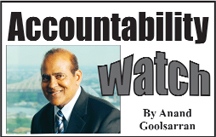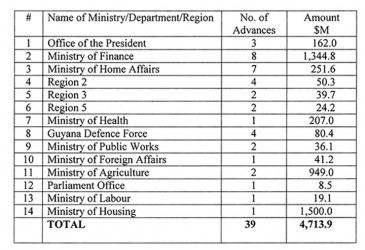The Public Accounts Committee (PAC) recently completed its examination of the public accounts of Guyana for the years 2010 and 2011. One of the issues of concern to the Committee was the abuse in the use of the Contingencies Fund. The PAC Chairman reportedly stated that the Finance Secretary seemed unable to clarify why this continued to happen and that a significant number of withdrawals from the Contingencies Fund did not satisfy the criteria set out in the Constitution and the Fiscal Management and Accountability (FMA) Act.
The Speaker of the National Assembly also weighed in on the issue when he stated that it is imperative for politicians to uphold the Constitution and that it makes no sense if the recommendations of the PAC are not going to be adhered to by the Government. He was of course referring to, among others, the continued abuse of the use of the Contingencies Fund year after year, despite repeated recommendations from the PAC to desist from doing so.
What should the Contingencies
Fund be used for?
 Article 220 of the Constitution provides for Parliament to make provision for the establishment of a Contingencies Fund and for authorizing the Minister of Finance to make advances from the Fund if he is satisfied that there is an urgent need for expenditure for which no other provision exists. Where any advance is made from the Fund, a supplementary estimate is required to be laid before the National Assembly as soon as is practicable to give covering authorization of the expenditure and to replenish the Fund with the amount so advanced.
Article 220 of the Constitution provides for Parliament to make provision for the establishment of a Contingencies Fund and for authorizing the Minister of Finance to make advances from the Fund if he is satisfied that there is an urgent need for expenditure for which no other provision exists. Where any advance is made from the Fund, a supplementary estimate is required to be laid before the National Assembly as soon as is practicable to give covering authorization of the expenditure and to replenish the Fund with the amount so advanced.
The FMA Act provides further details to give effect to the above constitutional requirement. Section 41(3) states that the Minister may approve of an advance from the Contingencies Fund if he is satisfied that an urgent, unavoidable and unforeseen need for expenditure has arisen for which:
(a) No moneys or insufficient moneys have been approved by Parliament;
(b) It is not possible to reallocate funds from the approved budget to meet the expenditure;
and
(c) The expenditure cannot be postponed without injury to the public interest.
In other words, the Contingencies Fund is set up to cater for situations of emergency where: (a) moneys are not available to address such situations; and (b) due to the nature of the emergency, it is not possible to convene Parliament to approve of the necessary funds. Examples include severe flooding as in the case of the 2005 Great Flood; and other natural disasters, such as earthquakes and tsunamis.
What has happened in relation to the
use of the Contingencies Fund?
If is clear from the above that the Contingencies Fund cannot be used to meet routine expenditure. Despite this, since the resumption of final reporting and audit of the public accounts with effect from 1992, hardly a year has passed without the Auditor General reporting on the abuse in the use of this Fund to meet routine expenditure. For example, in my 1995 report, I had made the following comments:
In previous reports, the apparent abuse of the use of the Contingencies Fund was highlighted. There was clear evidence in previous years that the Fund was used to meet routine expenditure when budgetary allocations were exhausted. This was so because recourse to the Contingencies Fund was an easier and more expedient proposition than seeking Supplementary Estimates from Parliament. However, in doing so the intent of the Law was being violated in that the majority of the advances granted from the Contingencies Fund did not satisfy the criteria for the grant of such advances…
These comments were repeated in successive years later. However, recent reports from the Auditor General on the matter were significantly milder in their comments although the situation had not changed. For example, in his 2012 report, the Auditor General stated that:
According to the Statement of Receipts and Payments of the Contingencies Fund as shown on pages 2/21 to 2/22, amounts totalling $4.714 billion were drawn from the Fund by way of thirty-nine advances. Previous reports highlighted instances where the criteria were not fully met for the granting of some advances, however, it has been observed that there has been closer monitoring of advances issued out of the Contingencies Fund resulting in seven advances totalling $95.661M listed below not meeting the criteria.
 The Auditor General, however, did not explain the nature of the “closer monitoring” of the advances nor did he state how such monitoring could result in fewer advances not meeting the criteria. The following is the list of advances given to Ministries and Departments during 2012:
The Auditor General, however, did not explain the nature of the “closer monitoring” of the advances nor did he state how such monitoring could result in fewer advances not meeting the criteria. The following is the list of advances given to Ministries and Departments during 2012:
Three of these advances were granted on 1 January 2012 while the remaining 36 were evenly spread out during the period August to December 2012. As indicated above, there has been no emergency since the 2005 Great Floods that would have necessitated recourse to the Contingencies Fund. Even when Parliament was in recess for two months during the August-October period, careful budgetary planning of expenditure could have avoided any recourse to the Fund.
This recurring problem of using the Contingencies Fund to meet routine expenditure has been the result of a lack of careful planning and consequently inadequate budgeting. To remedy this deficiency, instead of going back to Parliament through the front door with a humble request for supplementary funds, the back door approach is taken to access funds from the Contingencies Fund. Therein lies the abuse and the total disregard for the constitutional and legislative provisions.
Minister of Finance’s response
Reacting to the remarks made by the PAC Chairman and the Speaker, the Minister of Finance stated that during the current tenth Parliament, six Contingencies Fund papers (7/2011, 9/2011, 4/2012, 6/2012, 2/2013 and 4/2013) totalling $9.4 billion were presented in the National Assembly. Of this amount, the Assembly approved of sums totalling $8.7 billion, representing 92.2 per cent. He then asked the question: Where is the abuse?
The Assembly was extremely generous in approving expenditure out of the Contingencies Fund that did not meet the criteria highlighted above, notwithstanding that such expenditure might have been incurred to finance legitimate government operations. The Assembly would have done so with a very heavy heart in view of the fact that it was deprived of the ex ante opportunity to scrutinise and debate a request for supplementary funds. Indeed, it would have be an exercise in futility for the Assembly to engage in a debate about the merits of any expenditure that has already incurred. The milk has already been spilled, and the Assembly was merely asked to rubber-stamp expenditure already incurred. The fact that it has approved of any such expenditure should therefore be a source of embarrassment and not one of rejoice.
While the Minister should consider himself extremely fortunate that the Assembly approved of 92.2 per cent of the expenditure from the Contingencies Fund, he cannot escape liability for the 7.8 per cent or $700 million, which was not approved. This represents unauthorised expenditure and a loss of public property for which appropriate sanctions are provided for under Section 76 of the FMA Act:
If a loss of public property should occur and, at the time of that loss, a Minister or official has caused or contributed to that loss through misconduct or through deliberate or serious disregard of reasonable standard of care, that Minister or official shall be personally liable to the Government for the amount of loss.
Where the misconduct or disregard of the person is not the sole cause or the loss referred to in subsection (1), the person shall be liable to pay only so much of the loss as is just and equitable having regard to the person’s share of the responsibility for the loss.
If a loss of public property should occur and, at the time of that loss, a Minister or an official had nominal custody of that property, that Minister or official shall be personally liable to the Government for the amount of the loss.
Next week, we will examine Financial Paper 1/2014 tabled in the National Assembly last Thursday, dealing with a request for supplementary estimates to cover excess expenditure totalling $4.554 billion incurred during the period 1 January to 16 June 2014. It will be interesting how the Assembly will view this paper in the light of the fact that it had disapproved of the expenditure in the first place.





